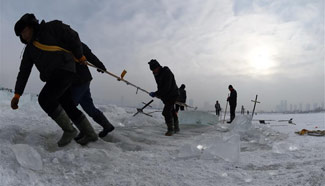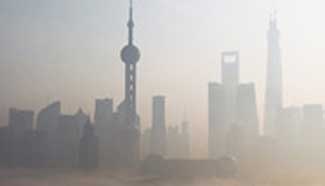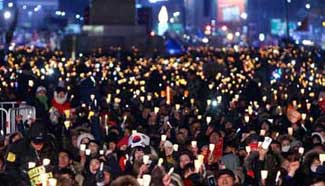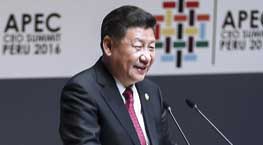by Jamal Hashim
BAGHDAD, Dec. 11 (Xinhua) -- After almost two months of fierce battles, the Iraqi army has retaken about 50 percent of Mosul city, the second largest city in the country which was seized by the Islamic State militants in June 2014.
The government vowed to announce the victory by the end of this year, however, the bloody street battles in the densely-populated city forced the military operations to slow down, as the troops cannot use airstrikes and heavy artillery in order to avoid heavy casualties among civilians.
Observers said the military operations could take weeks, if not months. The IS would remain in the country's border areas even after the government takes back Mosul, and is capable of threatening the country and beyond.
BATTLES UNDERWAY
More than 100,000 soldiers, including the Iraqi army, federal police, Kurdish Peshmerga fighters and paramilitary Shiite and Sunni Hashd Shaabi units, are currently engaged in the offensive to retake Mosul that started on Oct. 17.
Intelligence reports estimated that about 5,000 IS militants are holed up inside Mosul, half of them highly trained.
Like the previous anti-IS offensives that freed the Iraqi cities of Tikrit, Ramadi, Fallujah from IS militants, the troops moved gradually to encircle Mosul, some 400 km north of the Iraqi capital of Baghdad, after clearing IS militants from hundreds of towns and villages around it, before entering the city's populated districts.
On Oct. 31, the counter-terrorism forces took foothold in the city, sparking first street battles inside Mosul after it was seized by IS more than two years ago.
After more than six weeks of fierce battles, the troops extended their foothold in the eastern side of the city, and managed to free some 31 districts out of Mosul's 60 districts as of mid December.
The Shiite militia imposed a siege on the IS-held town of Tal Afar, some 70 km west of Mosul, and cut off the IS supply routes from Syria.
However, the advance of the Shiite militia in the ethnically mixed region, where Sunni Muslims form a majority, raised fears that may spark sectarian tension.
The authentic challenge facing the Iraqi military commanders is the heavily populated city of Mosul, as more than one million civilians remain living in the country's second largest city.
The UN Office for the Coordination of Humanitarian Affairs (OCHA) said in the latest report published on Dec. 4 that the military operations in Mosul have pushed some 82,068 civilians to flee their homes in the city and its adjacent districts and the number went up every day.
A previous OCHA report said that the worst-case scenario is that the number of civilians who might flee the city could reach 700,000. Up to 1.5 million people in the city could be in need of aid.
Mosul is the IS last major stronghold in Iraq, so the group more likely is unwilling to surrender without a fight. Recapturing the city would break the back of IS terrorist group, demolishing its self-declared state of Islamic "caliphate."
Early in November, the IS top leader Abu Bakr al-Baghdadi urged his fighters not to retreat from Mosul.
Military experts and observers believed that the battles to liberate Mosul would be long and bloody, based on the facts that the IS militants over the past two and a half years have dug an extensive network of tunnels to transport equipment and fighters.
The militants rigged roads and bridges with bombs and took over one million civilians as human shields.
Moreover, fierce battles are expected when the army cross the Tigris River and enter the western city. The western city features densely-populated buildings and narrow alleys that would make it more difficult for the army to retake districts.
POLITICAL AND SECTARIAN DIVISION
After the army surrounded Mosul, the experts said, it is a matter of time for the government to retake the city.
"Daesh will not fight in Mosul forever, as the Iraqi security forces backed by the international coalition will have no choice but to continue military operations until they liberate the city," Abdulllah al-Obeidi, a political expert, told Xinhua.
However, will the defeat of IS militants in Mosul would end the extremist group in Iraq?
"Daesh threat will not disappear in Iraq, because there are still smaller strongholds in Hawijah area near the northern city of Kirkuk and in the towns of Aana, Rawa and al-Qaim in Anbar province, in addition to the vast desert in western and northwestern of the country," Obeidi said.
The group will adapt their tactics and remain a threat to Iraq, the region and the world by pursuing guerrilla warfare, depending on their sleeping cells in the urban areas and their bases in the isolated rugged deserts, he added, as political division among the Iraqi factions still exist, which is the main factor for sectarian and ethnic polarization in the Iraqi society.
"Naturally, the sectarian and ethnic polarization are a breeding ground for violence and terrorism," Obeidi said. "Any party in and outside Iraq can use terrorists against its rivals, making the country rather fragile, instable and vulnerable in front of foreign interventions."
Moreover, the disputes among major powers on how to deal with extremist ideologies and terrorism, including the IS, is also an instrumental factor in creating such terrorist group.
"Last century, the United States supported rebels in Afghanistan during the Soviet Union invasion of Afghanistan and resulted in the emergence of al-Qaida group, and in 2003 it turned Iraq into a hornet's nest of terrorists and insurgents, where Daesh was born and it is much worse than al-Qaida," Obeidi said.
"The lack of universal agreement on the definition of terrorism enabled the U.S. to pursue its own set of rules to define the act of terrorism that would serve its own interests, and then use its criteria in dealing the world's crises," Obeidi said.
RECONSILIATION NEEDED
After the army retakes Mosul, a unified Iraq has become a crucial need for all factions in the country restore peace and stability.
"The toughest part of the struggle is bringing peace in the post-IS stage, as many possible conflicts could erupt in Nineveh province among the Iraqi factions in northern Iraq and with regional countries as well," Abdullah al-Jubouri, a political expert, told Xinhua.
Moreover, restoring stability to Mosul needs efforts to heal the wounds of the society, which is more important than the necessary military action. The pre-dominantly Sunni Arab city once was home to a complex mosaic of tribes and ethnic groups, but more than two and a half years under IS group planted the seeds of hatred and division.
"IS militants have created profound divisions across Mosul's society and within the families. The situation in post-IS Mosul won't be easy, as people in the liberated city will quickly go into recrimination, revenge and sectarian strife," Jubouri said.
As a result, the Iraqi government, the international coalition and the United Nations Assistance Mission for Iraq (UNAMI) should take the duty to pursue long-term engagement strategy with a greater focus on national reconciliation that could consolidate the peace and co-existence among Iraqi factions in Mosul as well as in other parts of Iraq, according to Jubouri.
"It is crucial to understand that such strategy is of great importance, because the Iraqi factions, regional countries and the international community have the interest to bring peace in Iraq and to dry up the resources of terrorism," Jubouri concluded.











